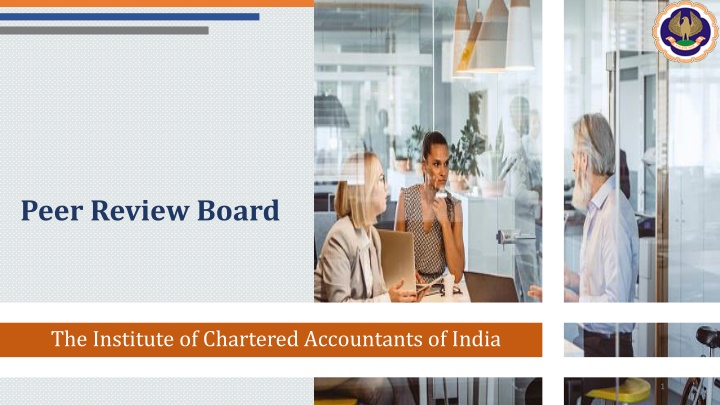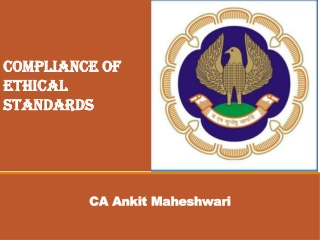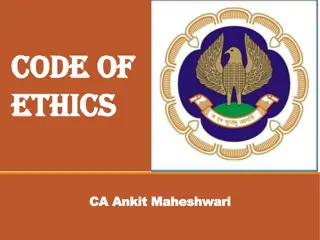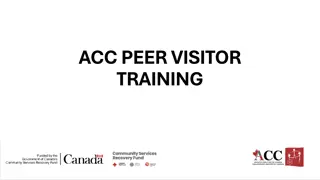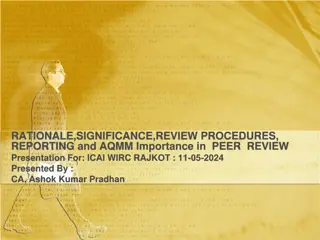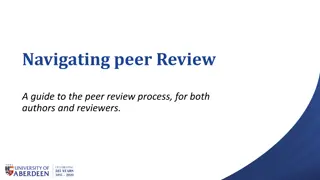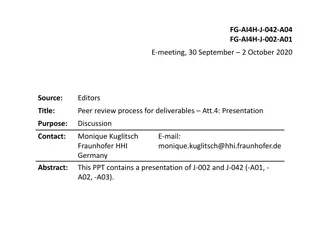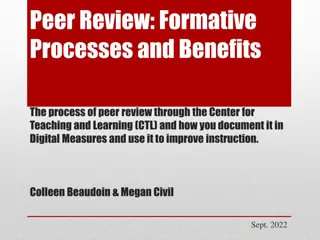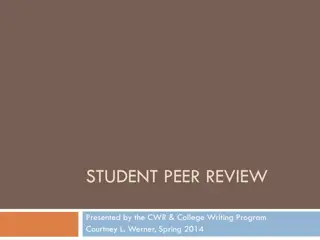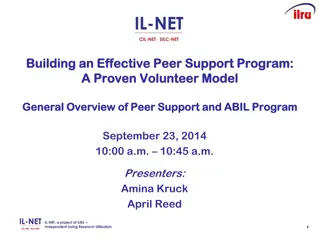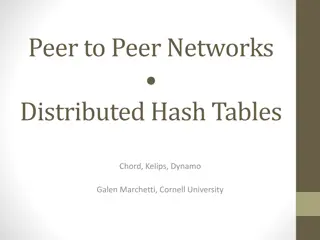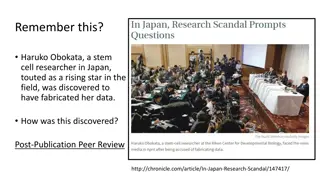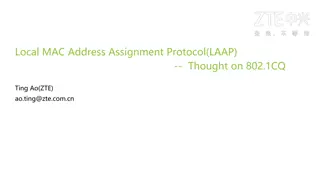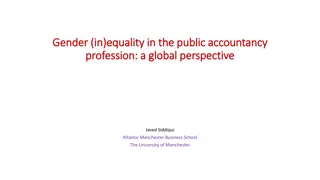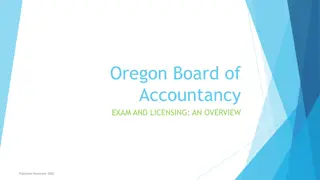Peer Review Mechanism in Indian Chartered Accountancy
Introduction of Peer Review by Institute of Chartered Accountants of India in early 21st century to enhance professionalism in auditing and accounting. Recognized by SEBI and C&AG for regulatory compliance and empanelment considerations.
Download Presentation

Please find below an Image/Link to download the presentation.
The content on the website is provided AS IS for your information and personal use only. It may not be sold, licensed, or shared on other websites without obtaining consent from the author.If you encounter any issues during the download, it is possible that the publisher has removed the file from their server.
You are allowed to download the files provided on this website for personal or commercial use, subject to the condition that they are used lawfully. All files are the property of their respective owners.
The content on the website is provided AS IS for your information and personal use only. It may not be sold, licensed, or shared on other websites without obtaining consent from the author.
E N D
Presentation Transcript
Peer Review Board The Institute of Chartered Accountants of India 1 Peer Review Board, ICAI
Inception of Peer Review In the beginning of 21st Century, the council of Institute of Chartered Accountants of India introduced the Peer Review Mechanism. The Institute of Chartered Accountants of India, in 1998 conceptualised a system of review of work of professionals. This regulated in constitution of Peer Review Board in early 2002. Peer Review Board, ICAI 2
Peer Review - Food for thought Idea behind Peer Review not a fault finding but a nurturing exercise The reviews begin with the assumption that professionals work professionally and end with an enhancement of those attributes of professionalism that serve to keep the Indian profession of Chartered Accountancy at the forefront of the accounting and auditing profession in the world Peer Review Board, ICAI 3
Peer Review Recognition by Regulators In India, the Peer Review auditors have been recognised by the Regulators Securities & Exchange Board of India (SEBI) With effect from April 1, 2010, SEBI mandated that the Limited Review/Statutory Audit reports submitted to the concerned stock exchanges by the Listed Entities shall be given only by those auditors who have subjected themselves to peer review process and holds a valid certificate issued by the Peer Review Board of the ICAI. Peer Review Board, ICAI 4
Peer Review Recognition by Regulators In India, the Peer Review auditors have been recognised by the Regulators Comptroller & Auditor General of India (C&AG) The Comptroller & Auditor General of India (C & AG) has revised the Policy of Empanelment of CA Firms/LLPs and appointment of auditors of Companies under Section 139(5) and 139(7) of the Companies Act 2013 and of Statutory Corporations/Autonomous Bodies as per the provisions of their respective acts. A maximum of 25 points have been allotted to firms which hold a Peer Review Certificate on the date of making an application for empanelment. Peer Review Board, ICAI 5
Peer Review Process at a Glance Submission of Form-1, Application cum Questionnaire by the Practice Unit. Selection of Practice Unit and appointment of Reviewer Planning Execution Reporting Peer Review Board, ICAI 6
Peer Review Process - Meaning What is Peer Review Process? Peer Review process is based on the Principle of systematic monitoring of the procedures adopted and records maintained while carrying out audit and assurance services in the course of one s professional responsibility to ensure and sustain quality . Peer Review, simply, means evaluation of professional work, performed by one, by others working in the same field Peer Review Board, ICAI 7
Eligibility to become a Peer Reviewer A member in practice a)having experience of at least 7 years of assurance practice Or b) having experience of at least 10 years in the employment + at least 3 years audit experience + he is in whole time practice at the time of enrollment and c) has undergone training for Peer Reviewers and cleared the online test conducted by the Board for empanelment as Peer Reviewer. Peer Review Board, ICAI 8
Eligibility to become a Peer Reviewer A member shall not be eligible if a) any disciplinary action / proceeding is pending with him. b) he has been found guilty of professional or other misconduct c) he has been convicted by a competent court whether within or outside India, of an offence involving moral turpitude and punishable with imprisonment A Peer Reviewer shall not accept any professional assignment from the Practice Unit for a period of two years from the date of appointment. Further, he should not have accepted any professional assignment from the Practice Unit for a period of two years prior to the date of appointment as a Peer reviewer of that Practice Unit or its partners in case of a firm. Peer Review Board, ICAI 9
Criteria of Peer Review Any Practice Unit may, suo motu, apply to the Board for the conduct of its Peer Review. Voluntary The Board, based on specific information received from Secretary, ICAI or Disciplinary directorate or any other Regulator, may conduct a special Peer Review. Special case The Board may conduct Peer Review of New Units as defined under clause 2(12) of Peer Review Guidelines, 2022. New Unit Peer Review Board, ICAI 10
Peer Review Mandate-Roll Out Implementation PHASE I Date from which Peer Review is Mandatory- 01.04.2022 Practice Units which propose to undertake Statutory Audit of enterprises whose equity or debt securities are listed in India or abroad as defined under SEBI (Listing Obligations and Disclosure Requirements) Regulations, 2015: For these Practice Units, there is a pre- requisite of having Peer Review Certificate. Category of firms covered for Mandatory Peer Review Peer Review Board, ICAI 11
Peer Review Mandate-Roll Out Implementation PHASE II Date from which Peer Review is Mandatory- 01.07.2024 Practice Units which propose to undertake Statutory Audit of unlisted public companies having paid-up capital of not less than rupees five hundred crores or having annual turnover of not less than rupees one thousand crores or having, in aggregate, outstanding loans, debentures and deposits of not less than rupees five hundred crores as on the 31st March of immediately preceding financial year: For these Practice Units, there is a pre-requisite of having Peer Review Certificate. OR Practice Units rendering attestation services and having 5 or more partners: For these Practice Units, there is a pre-requisite of having Peer Review Certificate before accepting any Statutory audit. Category of firms covered for Mandatory Peer Review Peer Review Board, ICAI 12
Peer Review Mandate-Roll Out Implementation PHASE III Date from which Peer Review is Mandatory- 01.01.2025 Practice Units which propose to undertake the Statutory Audit of entities which have raised funds from public or banks or financial institutions of over Fifty Crores rupees during the period under review or of any body corporate including trusts which are covered under public interest entities: For these Practice Units, there is a pre-requisite of having Peer Review Certificate. OR Practice Units rendering attestation services and having 4 or more partners: For these Practice Units, there is a pre-requisite of having Peer Review Certificate before accepting any Statutory audit. Category of firms covered for Mandatory Peer Review Peer Review Board, ICAI 13
Peer Review Mandate-Roll Out Implementation PHASE IV Date from which Peer Review is Mandatory- 01.04.2025 Practice Units which propose to undertake audits of branches of Public Sector banks : For these Practice Units, there is a pre-requisite of having Peer Review Certificate OR Practice Units rendering attestation services and having 3 or more partners: For these Practice Units, there is a pre-requisite of having Peer Review Certificate before accepting any Statutory audit. Category of firms covered for Mandatory Peer Review Peer Review Board, ICAI 14
Cost of Peer Review Minimum fee recommended for Practice Units where the period of Review is 3 years: Average gross receipts * Fees for PU conducting Statutory Audit of Listed entities Additional AQMM Review Fees for Fees Upto Rs 10 lacs p.a. Rs 15,000 Rs. 18,000 Rs. 5,000 Over Rs 10 lacs upto Rs. 50 Lacs p.a. Rs 25,000 Rs. 30,000 Rs. 5,000 Over Rs 50 lacs upto Rs. 1 crore p.a. Rs 40,000 Rs. 48,000 Rs. 5,000 Over Rs 1 crore upto 3 crore p.a. Rs 60,000 Rs. 72,000 Rs.10,000 Over Rs 3 crore upto 5 crore p.a. Rs 75,000 Rs. 90,000 Rs.10,000 Over Rs 5 crore p.a. upto 10 crore p.a Rs 1,50,000 Rs. 1,80,000 Rs. 20,000 Over Rs. 10 crore p.a upto Rs. 20 crore p.a. Rs. 2,00,000 Rs. 2,40,000 Rs. 20,000 Over Rs. 20 crore p.a upto Rs. 30 crore p.a. Rs. 3,00,000 Rs. 3,60,000 Rs. 25,000 Over Rs. 30 crore p.a. Rs. 5,00,000 Rs. 6,00,000 Rs. 30,000 * For calculating Average gross receipts/ revenue from assurance service clients of Practice Unit (Per Annum) the sum total of gross receipts/ revenue from assurance service clients for all the periods under review shall be divided by number of years under review. Peer Review Board, ICAI 15
Cost of Peer Review Minimum fee recommended for Practice Units where the period of Review is less than 3 years : In case of Partnership Firm - Rs. 1,000 per partner subject to minimum of Rs. 5,000 and maximum of Rs. 10,000 In case of Sole Proprietorship concern Rs. 5,000 Peer Review Board, ICAI 16
Thank you..!!! Peer Review Board The Institute of Chartered Accountants of India
